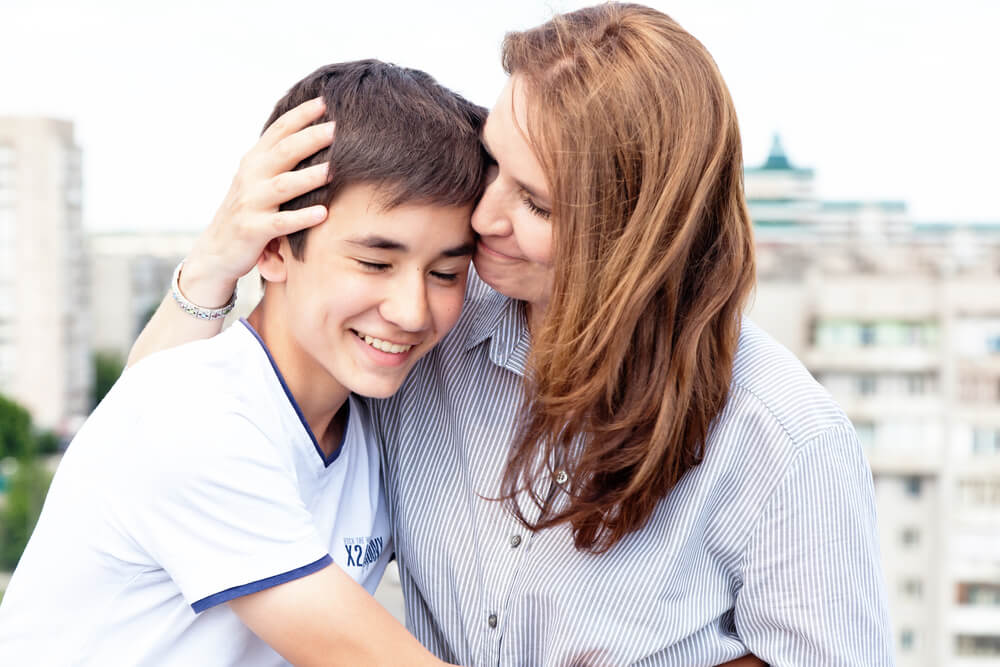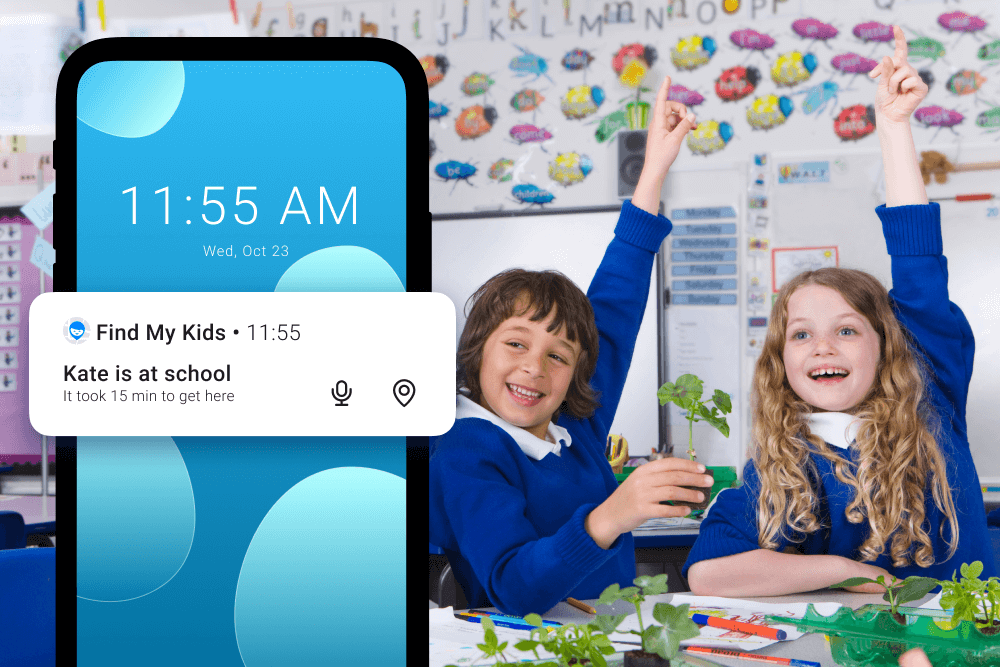How to Be a Good Mother? Clue: It’s Not About Being ‘Perfect’

Ever since pregnancy—and often even before it—it’s the question that’s constantly on our minds: how to be a good mother. Of course, we want the best for our kids, and to raise them in a warm, nurturing, loving environment in which they can reach their full potential.
But it can be hard to cope with the often conflicting parenting advice we’re getting from books, online, and even well-meaning friends. Not to mention the pressure piled on by those celeb and social media pictures of ‘perfect’ families and moms without a hair out of place. So, what does it really mean to be a good mom? The answer may surprise you.
Contents:
- What is a Good Mother?
- How to Be a Good Mother: Tips to Use Every Day
- How to Cope with Being an ‘Imperfect’ Mom
- Final Thoughts? You’re Doing Great
- FAQ
What is a Good Mother?

Kleber Cordeiro/Shutterstock.com
Being a good mom isn’t about ‘perfect.’ It’s not about never feeling frustrated or overwhelmed. It’s not about looking like Facebook images of moms baking with their children in which no one has dough in their hair and the youngest isn’t having a tantrum. It’s not about always knowing exactly what your kid’s behavior means or how to deal with it.
So what is being a good mom really about? According to therapists, it’s about taking the time to listen to your child when they want or need to talk. It’s about unconditional love and showing you care, even when your child is being difficult or their behavior is puzzling. And it’s about (trying!) to have patience, even when the time when your kid suddenly wants to talk is when you’re elbow-deep in work or household chores.
How to Be a Good Mother: Tips to Use Every Day
Try these great tips to help support your children every day and provide them with the listening ear they need. Remember, these tips aren’t meant to add to the pressure: simply trying your best to do these things can make a big difference.
Pay Attention to What Your Kids Need

Prostock-studio/Shutterstock.com
No matter their stage of development, try to pay close attention to what your kids are telling you. This is hard, as, for example, a teen may stomp off to their room and slam the door simply due to the normal mood swings of adolescence—or they could be distressed about something that’s happened at school that day.
Try taking a step back and observing your kid’s behavior, bearing in mind what’s ‘normal’ for them—and what’s not. What looks like difficult behavior could be your child asking for help or support. Be mindful of the non-verbal clues your child is giving, and use your intuition, too.
Listen Carefully

Evgeny Atamanenko/Shutterstock.com
And when your child wants to talk? Always try to take the time to listen, no matter how busy you may be. This is one of the most important ways to develop great, positive communication with your child. It also means they’ll know they can always come to you for help or advice in the future.
When your child is talking, pay close attention, and try not to interrupt or instantly ‘make things better.’ Listen to what they’re actually saying, and ask additional questions as needed. Check that you’ve fully understood by asking, for example, ‘So what you’re telling me is….’ Ask your child what they would like to happen next, or their ideas to resolve things, if relevant.
Practice Mindfulness When Spending Time Together

Anna Om/Shutterstock.com
Mindfulness is the practice of being fully present in the moment, whatever it is we are doing. It’s about phasing out the background chatter of our minds, worries, or thoughts of the other tasks we need to complete so that we can fully inhabit the present time. Practicing mindfulness is great for well-being in general, and is particularly good to employ when we’re spending time with our children.
More than anything else, our kids want our attention—our full attention, without the distraction of phone messages pinging in, or preoccupation with what’s next on the to-do list. If you have a very young child, try taking regular time out to sit down and engage with your child, giving them your full focus. This could be while simply listening to them tell you about what they’re playing, creating a den, or reading with them.
If it helps, set a timer, say for twenty minutes, twice a day, and commit to being totally present with your child during this time. You may be surprised at just how much better you and your little one feel once you make this a regular habit.
Be Consistent in Setting and Maintaining Boundaries…

Natali9yarova/Shatterstock.com
Consistency is important to kids: as well as helping them feel secure, it allows for effective boundaries to be established. While it can be really, really tempting to give in to a request for candy when you’re out shopping and your toddler threatens a tantrum, it’s important to stand your ground. Otherwise, you could be making it even more difficult to say no next time.
Being consistent can be challenging, but remember that, in practicing this, you’re giving your children a valuable life lesson and helping them to make better decisions as they get older. And, ultimately, it’ll help the household run more smoothly.
…But Make Time to Have Fun!

Alliance Images/Shatterstock.com
How to be a good mother is not all about being serious and sensible: build some time to have fun in your family schedule! This is a lovely way to develop and maintain a strong bond with your child and is great for everyone’s wellbeing.
The options are endless: enjoy a regular family movie and popcorn night, head out for a day trip, or simply put off doing the dishes for an hour and get everyone together for a favorite board game.
Teach Self-Worth

Evgeny Atamanenko/Shutterstock.com
One of the best ways that a parent can teach their child self-worth is by modeling self-love themselves. Try not to put yourself down (especially in front of your kids), and, instead, talk about the things you like about yourself, or achievements you’re proud of. Similarly, help your child to recognize their unique abilities and gifts—and encourage them to explore new things, too. This can help them discover new interests and build resilience.
It’s also a good idea to praise your kids when they attempt something—even if it doesn’t work out. Share your own stories about times you’ve not succeeded at something, but what this taught you. Perhaps you tried again and did succeed, or the attempt itself taught you a valuable lesson.
Nurture Your Relationship with Your Partner

VGstockstudio/Shutterstock.com
The happier you are and the better you feel, the better you’ll be able to parent. Ultimately, when mom and dad are happy, the kids are going to enjoy a more uplifted home, that feels nurturing and supportive.
So, if you have a partner, be sure to make your relationship a priority. It’s easy to let the romance slide, with the wakeful nights and general chaos of parenthood. Things like date nights may seem a thing of the distant past. However, it’s important to take care of your relationship, even if things look a little different than they used to! A date night doesn’t have to be a complicated affair: a couple of drinks at the local pub, a walk in the countryside followed by lunch, or even a movie night at home without the kids. The important thing is being together and focused on each other.
And that practice of mindfulness we talked about earlier? Try to bring it to bear when communicating with your partner, too. Make time to properly talk together, even if this is just for five or ten minutes at the end of the day, rather than briefly touching base while doing chores. These things can make a huge difference.
Provide Shelter and Safety
Be proud of yourself, too, for providing your children with the shelter, safety, and food they need—and working hard to do so. From an early age, you can teach your kids the importance of a nutritious, delicious diet, by introducing them to a wide variety of foods—even if they don’t want to try them! Again, modeling a healthy lifestyle is key here.
Once your child is old enough to start going out and about on their own, you may have additional concerns about their safety and whereabouts. Happily, there are lots of tools you can use to help keep your kid safe when they’re out of the house, such as Findmykids, which allows you to track where your kids are, view the routes they’ve previously taken, set up ‘safe zones’ and more.
Create a Life Outside of Parenting
Looking after yourself and taking good care of your well-being is vital. It’s also important to create a life for yourself outside of parenting, that represents your own interests, hobbies, and passions.
Make time, when you can, to get out to meet up with friends, or to take that evening class you always wanted to. This will get easier as your kids get older, but carving out time for yourself—even when your child is very small—will work wonders for your happiness and help you have the patience and resilience needed for everyday parenthood.
Try Not to Make Comparisons

triocean/Shutterstock.com
With social media, it’s easier than ever before to make comparisons between ourselves and other moms. It’s tempting to see these other moms as being more organized and generally better ‘put together’ than we are. Seeing all those Facebook posts of perfectly groomed parents with perfectly well-behaved kids, it’s easy to feel a little down.
Always remember that, with social media especially, we’re never seeing the whole story, but, rather, a curated snapshot. After all, do you share a lovely photo of your family enjoying a day at the beach, or the image from ten minutes before of your youngest red-faced and screaming because you said no to a second ice cream?
Plus, every mother has her unique skills, mindset, and priorities when it comes to childcare. Sure, some moms may be better organized, while others are extra creative, and others are amazing at whipping up homemade feasts.
Check it out: Which Celebrity Mom Are You? Quiz!
Embrace the Little Things

MilanMarkovic78/Shutterstock.com
Kids remember the things and moments that matter: and what these are may surprise you. In time, your child may not recall the spectacular pile of birthday gifts they received, but they will always remember the time you surprised them with an impromptu picnic, or took a couple of hours off work to snuggle on the sofa watching a favorite movie.
Embrace the little things that mean a lot, rather than stressing about things that haven’t necessarily gone to plan. Let go of that inner critic and, instead, enjoy the journey. In time, you’ll likely look back fondly on even the more challenging aspects of parenthood.
Being a good mom is easier with reliable assistants! Alleviate worries and ensure your child’s safety even when they’re not with you, with the Findmykids app. Always stay informed about their location and what’s happening around them.
How to Cope with Being an ‘Imperfect’ Mom

Ground Picture/Shutterstock.com
First of all, bear in mind that you’re trying your best and that being a mom is hard work. All the stages of your child’s development have their own set of challenges, and all of us are, to a greater or lesser extent, learning on the job! Here are some tips for coping with that feeling of not being good enough:
- Be proud of your efforts, and take pride in being ‘good enough’ rather than constantly striving for unattainable ‘perfection’.
- Understand that it’s normal to find some stages more enjoyable than others—and for some to be a real challenge. It’s normal to not enjoy every single aspect of parenthood, so try not to feel guilty about having these feelings.
- Take care of your well-being, by eating a nutritious diet, staying active, and trying to get enough sleep. The latter may be difficult if you have very young children; if this is the case, try to nap during the day, or at least rest while your little one naps.
- Consider joining a parents’ support group—these can be a great way to hear about other moms’ stories of ‘imperfection’ and share advice. They’re a wonderful way to make new friends, too.
- If you’re feeling really down, or have felt low for a while, then talk with your doctor or consider chatting with a therapist. Accessing the support you need can make a big difference.
It’s also really important to remember that nothing can be ‘perfect’ when kids are involved! Whether this is a tantrum during a much-anticipated day out, a diaper accident on a plane, an independent-minded older child, or a moody adolescent, things will rarely go totally to plan. Often, though, these things don’t matter. What does matter is the loving, nurturing home you’re providing for your kids, and that you’re raising them to love and respect themselves. And if you sometimes burn the Sunday dinner? Who cares!
Final Thoughts? You’re Doing Great

Olezzo/Shutterstock.com
Being a mom is tough, full stop. Some parts of parenting are extremely challenging—and there are parts that you’re likely to find unenjoyable. That’s okay. Rather than focusing on unattainable ‘perfection’ aim for ‘good enough’—and be proud of doing your best. Prioritize listening to your child, understanding their needs, and making time to simply have fun together. And be kind to yourself: you’re doing great.
Let us know your tips for resisting the ‘perfection’ pressure—we’d love to hear your thoughts in the comments below. And if you know another mom who needs to hear that they’re doing great, hit the share button.
FAQ

Alliance Images/Shatterstock.com
What makes a good mom?
A good mom isn’t about looking like the moms you see on social media or reality shows. It’s about providing a safe, nurturing, loving home, trying your best to listen to and understand your child, and always having time for them if they need your help or advice.
How do I know I am a good mother?
The fact that you’re concerned about being a good enough mother already shows how much you care. If your kids are safe, fed, and have their basic needs met, and you’re trying your best to listen and make time for them, teach them self-worth, and enjoy a good (not ‘perfect’!) life, then it’s likely you’re a great mom.
What is Cold Mother Syndrome?
Cold Mother Syndrome is where a person’s maternal figure is emotionally absent, and this figure puts a psychological distance between themselves and their child. This may have a lasting impact on the child, who could experience insecurities and difficulties forming emotional attachments later in life.
Why is self-care so important in being the best mom possible?
If we’re not feeling our best, it’s unlikely we’ll have the energy to give our very best in anything, including parenting. Attending to our own well-being works to ensure we have the energy and patience needed for the job of being a mom.
What is mindful parenting?
Mindful parenting aims to respond to your child’s behaviors (however difficult) thoughtfully, rather than simply reacting to them. Using this approach may reduce stress and improve relationships between parents and children.
The picture on the front page: rock-the-stock/Shutterstock.com
Проверьте электронный ящик




















